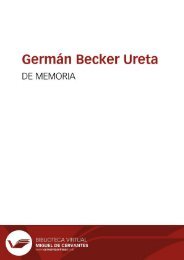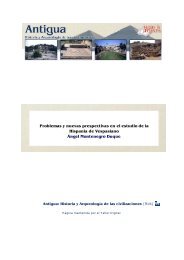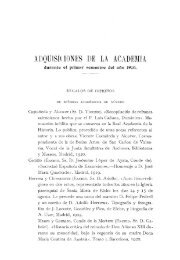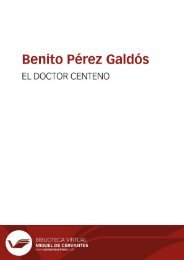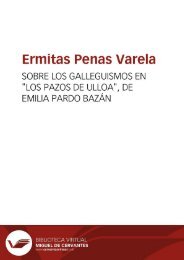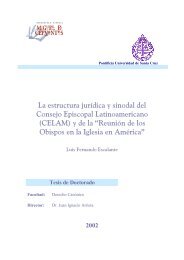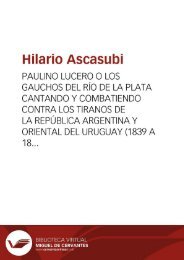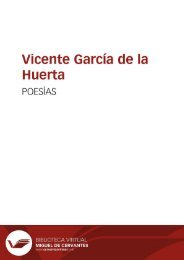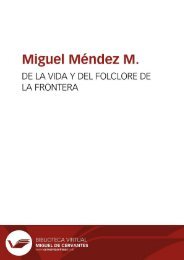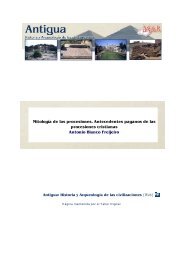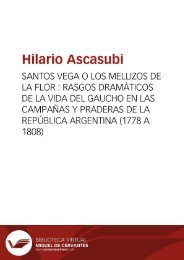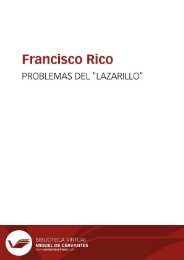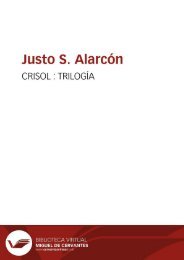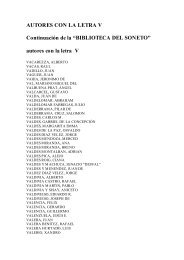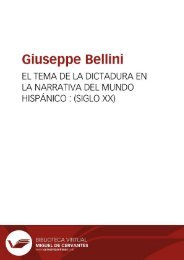You also want an ePaper? Increase the reach of your titles
YUMPU automatically turns print PDFs into web optimized ePapers that Google loves.
Anales galdosianos [Publicaciones periódicas]. Año XII, 1977<br />
The second iconoclast, Rosalía Bringas, « a quien jamás la maledicencia había hecho ningún agravio<br />
» (IV, 1474), is very proud of her spotless reputation. For many years she withstands with great<br />
resignation her husband's avarice -having to account for every penny spent, having no means of her<br />
own- until one day when she yields to a whim and purchases a manteleta . As she gets deeper in debt<br />
and pressures increase she contemplates the unthinkable: to sell herself for profit. She then muses: «<br />
La necesidad... es la que hace los caracteres. Ella tiene la culpa de muchas desgracias, y considerando<br />
esto, debemos ser indulgentes con las personas que no se portan como Dios manda. Antes de acusarlas<br />
debemos decir: Toma lo que necesitas; cómprate de comer; tápate esas carnes... ¿Estás bien comida,<br />
bien vestida? Pues ahora... venga moralidad » (IV, 1652). Thus she seems to paraphrase the very<br />
ideas expressed before by Amparo's delinquent sister, and yet there is great irony here. She shows<br />
little compassion to Refugio and in her final interview with her in the second novel she takes a superior<br />
stance although both have come to the same end. The pressures imposed by society on women, <strong>Galdós</strong><br />
makes clear, are devastating.<br />
Neither Refugio nor Rosalía consider for a moment the possibility of achieving independence<br />
through some profession. Tristana is clearly ahead of them when she laments those restrictions that<br />
will not allow her to become a lawyer or doctor. And yet she is still far from being an example of the<br />
«new woman»; she harbors serious contradictions.<br />
Casalduero relates Tristana to Amparo, not to Refugio 190 ; and Carmen Bravo Villasante compares<br />
her to the mania-prone Isidora of La desheredada 191 . While our heroine does not share Amparo's<br />
timidity -<strong>Galdós</strong> constantly calls the older of the Emperador sisters « débil » and « medrosa »<br />
she is not as resolute as she would like to think. Not for one moment does it cross her mind to escape<br />
from the home of her guardian as well she could. For all her dedication to the study of languages and<br />
the piano, there is a basic insecurity in her; she cannot find herself and will later, in the same spirit,<br />
turn to religion and the culinary arts. That she has an inquiring nature, is restless and impatient, there<br />
is no doubt, but we come to question whether she is indeed talented. She herself has these doubts<br />
and exclaims: « Quiero tener una profesión y no sirvo para nada, ni sé nada de cosa alguna. Esto<br />
es horrendo » (V, 1580).<br />
190 Op. cit. , p. 104.<br />
191 Op. cit. , p. 119.<br />
141



